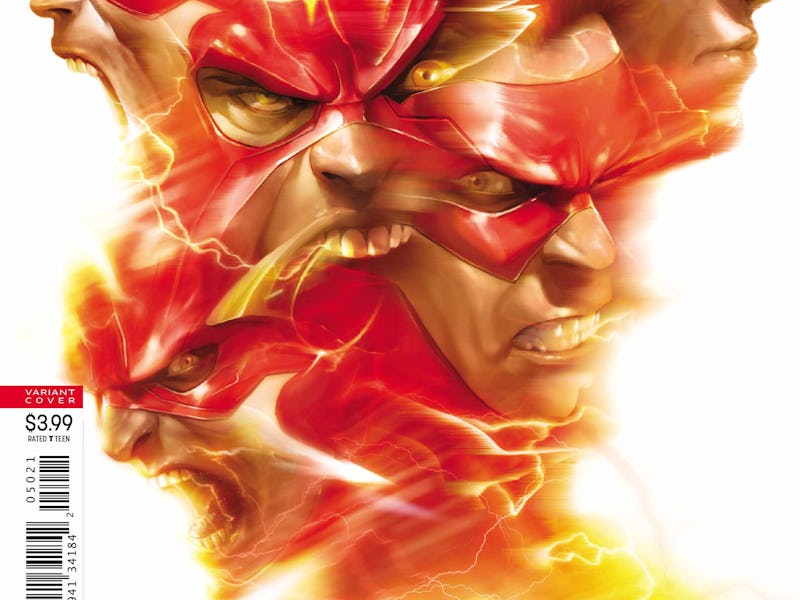DC's 'Flash War' Sparks a Comic Book Showdown Thirty Years in the Making
We talked to comics writer Joshua Williamson about the 'The Flash' #50.

When Joshua Williamson was hired to write The Flash for DC Comics, it was a dream come true for a lifelong fan of the Scarlet Speedster. But at the same time, the California native had a lot of questions.
“I was curious about Rebirth and the direction of these characters,” Williamson tells Inverse. “I had a lot of questions. I think about these characters every day. All day long I’m thinking about Barry and Wally.”
Barry Allen and Wally West: the two men who have carried the mantle of The Flash and defined their own generations of comic book readers. But in Williamson’s “Flash War,” a multi-part story that ends with The Flash #50 on July 11, Barry and Wally square off in a battle thirty years in the making.
“Thinking about these two, there was some natural conflict that had never been played up,” Williamson says. “What I pitched was, ‘Barry versus Wally.’ You can do something impactful with these two, and DC agreed.”
In “Flash War,” Barry Allen comes to grips with recent mistakes as his former sidekick turned solo superhero, Wally West, aims to use the Speed Force — the cosmic energy that gives all Flashes their powers — to bring his missing family back. Knowing the potential damage Wally could do to the DC Universe (and because Barry has made the same mistake before with epic consequences), Barry now stands in the way of his former sidekick.
Cover of 'The Flash' #50, illustrated by Howard Porter.
“Flash War” lets Williamson answer a question that Flash fanatics have asked for decades: When it’s Barry versus Wally, who is the fastest man alive? But Barry fighting Wally is more than just an all-out brawl.
“It can’t just be punching and kicking and a race,” Williamson says. “It’s gotta be real and emotional. There’s real conflict between these two characters.”
The conflict, Williamson explains, is an idol falling short of expectations, like a sports superstar who shines on the field but isn’t worthy of worship in the locker room. To understand Wally’s admiration for Barry, and why it’s been zapped away, you have to go back to when Barry died and Wally took over as the Flash in 1985’s Crisis on Infinite Earths.
“When Barry died, Wally put Barry on a pedestal of perfection,” Williamson explains. “You see it in The Return of Barry Allen by Mark Waid. One of the things I found interesting was, over time, everyone, not just Wally but readers, also started putting Barry on this pedestal.”
Preview of 'The Flash' #50, illustrated by Howard Porter and Hi-Fi.
Barry’s comics before Crisis show anything but a perfect superhero.
“Go back and read stories pre-Crisis,’” he says. “You see Barry was not this golden idol. He was much more complex. He made mistakes, but Barry sacrificed himself, and you never speak ill of the dead.”
From the Silver Age until the 1980s, Barry Allen ran circles around bad guys as the Flash, one of the founding members of the Justice League. After his death, Wally West — then known as Kid Flash — took up the mantle and succeeded Barry’s legacy to earn his own reputation throughout the 1990s and 2000s. Things changed in 2009 when Barry came racing back to life in Geoff Johns’ The Flash: Rebirth, but after 2011’s Flashpoint — where Barry went back in time to stop his mother’s murder, consequently changing the universe — it was Wally’s turn to go.
Preview of 'The Flash' #50.
Unlike Barry, Wally suffered an darker fate: He was erased from existence and forgotten by everyone (including Barry). Years later, in 2016, DC began a “Rebirth” that lived up to the name. The universe-wide reboot saw many lost elements and characters restored to canon, including the return of Wally West. But ever since Wally came back, there’s been bad blood between the two heroes.
“Flash War” is Williamson letting the two Flashes address the speedster elephant in the room, and it’s going to change the Flash from here on out.
“The story I’m trying to tell with the Flash is bigger than ‘Flash War,’” he says. “It’s the biggest story I’ve done on The Flash, but I hope that when I’m done, someone can look at my first issue and my last issue and tell I was telling one story the whole time. We’re still in the middle of this big story. ‘Flash War’ is just where it gets ramped up.”
'The Flash' #50.
The Flash #50, the ending of “Flash War,” hits shelves on July 11.